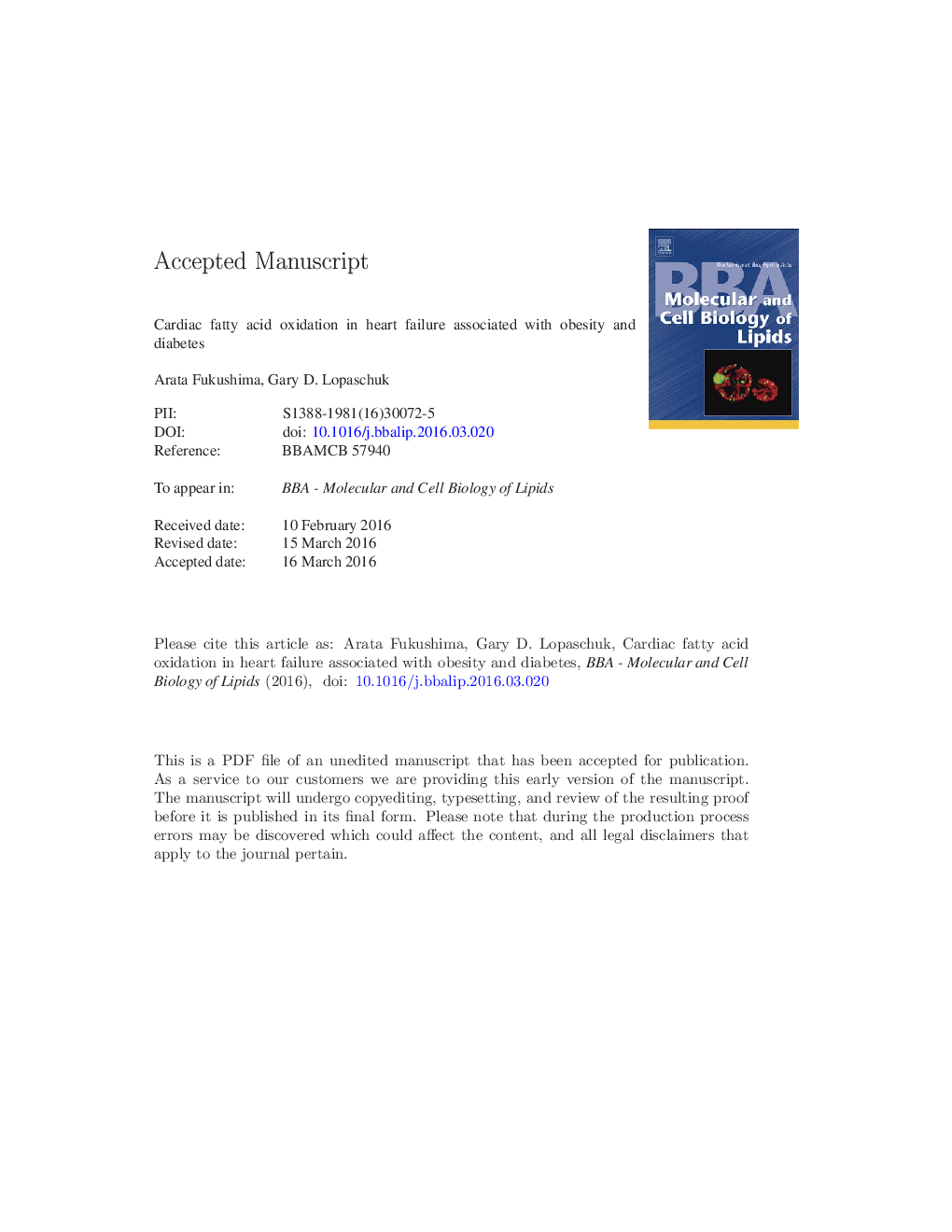| کد مقاله | کد نشریه | سال انتشار | مقاله انگلیسی | نسخه تمام متن |
|---|---|---|---|---|
| 1949035 | 1537699 | 2016 | 50 صفحه PDF | دانلود رایگان |
عنوان انگلیسی مقاله ISI
Cardiac fatty acid oxidation in heart failure associated with obesity and diabetes
ترجمه فارسی عنوان
اکسیداسیون اسید چرب قلب در نارسایی قلبی مرتبط با چاقی و دیابت
دانلود مقاله + سفارش ترجمه
دانلود مقاله ISI انگلیسی
رایگان برای ایرانیان
کلمات کلیدی
چاقی، دیابت، نارسایی قلبی، مقاومت به انسولین، استریل لیزین،
موضوعات مرتبط
علوم زیستی و بیوفناوری
بیوشیمی، ژنتیک و زیست شناسی مولکولی
زیست شیمی
چکیده انگلیسی
Obesity and diabetes are major public health problems, and are linked to the development of heart failure. Emerging data highlight the importance of alterations in cardiac energy metabolism as a major contributor to cardiac dysfunction related to obesity and diabetes. Increased rates of fatty acid oxidation and decreased rates of glucose utilization are two prominent changes in cardiac energy metabolism that occur in obesity and diabetes. This metabolic profile is probably both a cause and consequence of a prominent cardiac insulin resistance, which is accompanied by a decrease in both cardiac function and efficiency, and by the accumulation of potentially toxic lipid metabolites in the heart that can further exaggerate insulin resistance and cardiac dysfunction. The high cardiac fatty acid oxidation rates seen in obesity and diabetes are attributable to several factors, including: 1) increased fatty acid supply and uptake into the cardiomyocyte, 2) increased transcription of fatty acid metabolic enzymes, 3) decreased allosteric control of mitochondrial fatty acid uptake and fatty acid oxidation, and 4) increased post-translational acetylation control of various fatty acid oxidative enzymes. Emerging evidence suggests that therapeutic approaches aimed at switching the balance of cardiac energy substrate preference from fatty acid oxidation to glucose use can prevent cardiac dysfunction associated with obesity and diabetes. Modulating acetylation control of fatty acid oxidative enzymes is also a potentially attractive strategy, although presently this is limited to precursors of nicotinamide adenine or nonspecific activators of deacetylation such as resveratrol. This review will focus on the metabolic alterations in the heart that occur in obesity and diabetes, as well as on the molecular mechanisms controlling these metabolic changes. This article is part of a Special Issue entitled: Heart Lipid Metabolism edited by G.D. Lopaschuk.
ناشر
Database: Elsevier - ScienceDirect (ساینس دایرکت)
Journal: Biochimica et Biophysica Acta (BBA) - Molecular and Cell Biology of Lipids - Volume 1861, Issue 10, October 2016, Pages 1525-1534
Journal: Biochimica et Biophysica Acta (BBA) - Molecular and Cell Biology of Lipids - Volume 1861, Issue 10, October 2016, Pages 1525-1534
نویسندگان
Arata Fukushima, Gary D. Lopaschuk,
